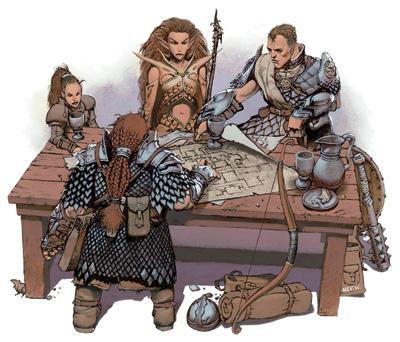So you and your party are on their merry way to clear out a long-abandoned fortress nestled deep within a remote mountain range. On your way, a shady-looking Verdan with green skin and pointed teeth approaches you.
They speak passionately and inflect with their hands, but no one in your party understands the meaning of their Goblin language.
It would be great if you could understand their warning about that mind flyer who lives in the fortress you are about to explore, but the Dungeon Master laughs and you are on your way. This is the kind of situation where the Comprehend Languages spell can shine. Welcome to a Comprehend Languages 5e Guide.
Bottom Line Up Front
Comprehend Languages is a great utility spell that can get your character and your party out of a jam. It is a first level Divination spell that allows your character to understand most spoken or written communications for up to one hour given a few limitations. It is well worth the first level spell slot.
What is Comprehend Languages?

Comprehend languages is a first-level Divination spell found in the Player’s Handbook (or PHB) on page 224. It is a class of spells known as Divination spells that give users a clearer picture of either the past, present, or future circumstances around them.
The spell itself gives the caster the ability to understand the literal meaning of spoken language or understand written language that they can touch.
With this spell, it takes one minute to read one page of text or its equivalent (at the Dungeon Master or DM’s digression.) The spell itself lasts for one hour unless it is modified by some other condition such as Extend Magic.
During the one-hour duration of the spell, the caster has to keep up their concentration on this spell to continue its effects. That means that they can not cast another spell with a concentration requirement during this time.
It also means that if you take damage you must make a dice check (or a DC). Concentration spells require a constitution roll (your 20-sided die or D20) plus your constitution modifier to see if you can concentrate through the pain that you just received.
All concentration spells require either a roll greater or equal to 10 or half the damage inflicted rounded down to the nearest whole number (if the rounded damage is higher than 10) to succeed.
Also if you take damage from multiple sources, you need to make multiple saving throws to see if you are concentrating enough to maintain the spell. Lastly, if you become incapacitated such as being put to sleep or stunned, you will lose the effects of the spell.
Great, so what does this do for you? Like in our example above, a wizard who could cast Comprehend Languages could translate the words the Verdan said from Goblin into Common as the words were spoken.
This means that you could understand the words that the Verdan was trying to tell you earlier. Because the spell is an hour-long, you could also understand any other language spoken within earshot as long as the spell was still active.
So if someone was speaking in Draconic, another person spoke Elvish and your spell was up, you would be able to understand them all.
What Comprehend Languages is not

There are limits to what Comprehend Languages can do. It is not an excuse to understand everything, all the time. The PHB explicitly prevents Comprehend Languages from decoding encoded texts.
For instance, if a cult you are tracking wrote their orders in Infernal but used a cipher to encode their message from prying eyes. Comprehend Languages would not instantly decipher the text, instead, it would be incomprehensible Infernal.
Per the PHB, Comprehend Languages does not give you the ability to understand symbols, glyphs, or runes. Pictographs are not mentioned by the PHB but they could fall into this category as well based on the DM’s digression.
So, for instance, you find a text written in Gnomish but whenever they mention names, there are circles with lines through them or squiggles that represent people. Comprehend Languages would not give you the missing names of these people.
The PHB also says that you understand the literal meaning of what is being said. To me, this means that the DM is not required to tell you exactly what they mean but has a lot of room to play with.
For anyone who has learned more than one language over their lives, different languages have widely different ways of arranging their sentences, words, and meanings to express their point.
Idioms are often difficult for non-native speakers of a language to understand. For example, my mother often says a Spanish phrase that translates to English as: “you are going to the theater of the white sheets.”
The person is not following the literal meaning of the phrase and going to a movie theater full of white sheets; it means the theater of dreams when you were tired.
The phrase is taken to mean “they have drifted off to sleep” but that is not what is being said. This is an example of how native speakers of a language use common and sometimes fanciful phrases to better express what they mean.
Likewise, a clever DM could use phrases that would not make sense to you but would be understood by natural speakers of a language. The same tracks for euphemisms such as “he’s not the brightest bulb in the box” inferring that someone is not smart as opposed to its literal meaning.
So even within the rules of Comprehend Languages, the DM has a lot of ground to play with in making the translated text clear or muddied.
Probably the biggest misunderstanding of Comprehend Languages is that it does not give you the ability to speak or write in the language being spoken. Comprehend Languages does not replace being fluent in a language.
Being fluent in a language gives you the additional benefits of being able to write and speak the language to its speakers so is more useful in that way.
It does not mean that Comprehend Languages is bad but it also balances it out and makes taking languages as part of your build more meaningful and impactful.
Also, you might have guessed by this point that Comprehend Languages does not give you the ability to speak with animals. That’s a different spell aptly called Speak with Animals.
While in this fantasy setting, animals can communicate with other members of their species or even across species that are not within the powers of this spell (unless you can convince your DM otherwise.)
The last limitation of Comprehend Languages is more of a reinforcement of what I’ve mentioned before: it’s whatever the DM wants it to be. If the DM wants to hide information from you, it is completely within their prerogative to do so.
If they want to give you a little break and allow you to read a set of runes when the PHB says they shouldn’t, they can do that as well. Just work with the DM and know that there are no rules which the DM could not home-brew around.
Who can Cast Comprehend Languages?
The PHB limits Comprehend Languages to the classes of Bards, Sorcerers, Warlocks, and Wizards. Through the lore of D&D, these characters can channel arcane energies and cast spells through different means.
Because this is a proper magic spell, it makes sense based on the lore that this spell is limited to these classes. Comprehend Languages is also unavailable to other magic users such as Artificers or Blood Magic wielders for flavor reasons as it is a different type of magical ability.
Non-casters may be able to take advantage of Comprehend Languages in some creative ways. Equipment such as rings can be enchanted with the Comprehend Languages spell to give its wearer the ability to use the spell (usually for a limited amount of time per day or long rest.)
There is also the possibility of various potions, scrolls, wands, or even home-brewed avenues that a non-caster character or even a caster without this great utility spell could take advantage of it.
How Players Can Use Comprehend Languages

You can learn and prepare one of these spells per the mechanics of your class. You will have to have the spell prepared in advance before you can cast it unless your character has a rule that can ignore that requirement. After that, you can cast it as any other spell from your class.
Casting Comprehend Languages requires a verbal component, a somatic component, and material components. The material components are explicitly given by the PHB as a pinch of soot and salt. The verbal and somatic components are left up to the player to decide.
I like to think about my character, and flavor the verbal and somatic components to the way that my character would cast them.
For example, if I am playing a College of Lore Bard, I might make the verbal component a call to tell me a story, and the somatic component very specific gestures that I use to draw the speakers into my circle.
I think that playing as a caster is much more fun I take the time to fit spells within the aesthetic or lore of their character.
Some notes on being a good caster. Make a mental or physical note of when you cast the spell or what was going on to refer back to.
It is up to you to keep track of how long it has been in terms of in-game time that your spell has been up. If you are outside of combat and your party is doing a bunch of stuff you might have to ask the DM how long it has been since that time you cast Comprehend Languages.
Also, you might want to make a note to yourself that you have Comprehend Languages active. If you forget and cast another concentration spell or miss a bit of important information spoken in another language, that is on you.
How DMs Can Use Comprehend Languages

There are several creative solutions that you could use to increase the immersion of your world or adjust the difficulty for your players.
One of the biggest challenges for any DM if they have a player who knows Comprehend Languages is to keep certain information out of their hands. This could be done in a variety of situational ways.
My favorite is putting some or all of an important bit of information in code. It doesn’t have to be an actual cipher (unless you want it to be.) In a non-fantasy, historical setting, cryptography was used as early as ancient Egypt and Mesopotamia (circa 1900 and 1500 BCE respectively.)
It could make sense that a secret group of assassins or cultists would have ciphers or secret symbols which would be incomprehensible to anyone outside of those organizations.
My advice is to make it believable and natural within the setting that you have created so it integrates seamlessly into the world around the players.
On the other side of the coin, a clever DM could intentionally leave information in another language but uncoded to toy with their players.
If you did not want to call out the obvious information drop or add a little flavor to the group of Lizardfolk highwaymen, you could put their communications in Draconic and see if your players pick it up.
It might be a little weird if the same group wrote all of their communications in Common just so the players could pick it up sometime down the line.
Also, keep in mind that your NPCs may organically know Comprehend Languages as part of their build or just their daily life. If the players try to hide their plans by speaking in a language your NPC wouldn’t know, you might want to try to cast Comprehend Languages and see if they notice.
Lastly, remember that when you give your players the translated version of a conversation or text, it does not have to be in the grammar or syntax they would normally use.
You could make it difficult for your players by using a Japanese-like syntax of objects, verbs then subject instead of the typical English subject, verb, and object structure.
Play around with it and make it as tricky or easy as you think they need on a situation-by-situation basis.
Making Comprehend Languages Fun and Immersive

I can’t emphasize enough how much flavor adds to spells. Don’t be afraid to get creative and innovative with how you cast Comprehend Languages.
You might also want to think of how it looks when the spell is being cast and how the spell looks once it is cast, especially because it has a duration of one hour.
You could do something like give your character runes all over their body that glows when another language is spoken as the visual flavor of the spell. Go wild with it.
In addition to flavor, also remember to be a good player in a group of other players. Everyone wants to have fun and for their character to have a moment in the sun.
I always feel that if a character can natively speak Sylvan as part of their build, let them take the lead on eavesdropping on that Half-Elf rogue.
If no one in the party understands Sylvan, that is where Comprehend Languages can shine and my character can take center stage for a moment.
Maybe your character with Comprehend Languages gives you the literal meaning of the words but the character who natively speaks Sylvan has a much better understanding of what is being said than you do.
So try and work with the other players at your table to understand what languages they know so you know when they could take the lead or when you might want to jump in instead.
You could also do a little flavoring in cooperation with one of the other players. Maybe they learned Sylvan as a child but don’t know every word in the expansive Sylvan vocabulary.
Partnered with your character casting Comprehend Languages you might be able to better understand what is being said and converse more effectively with the intended character.
Build Ideas: Bards

College of Eloquence
The College of Eloquence gives Bards the ability to manipulate characters with their words. At level six, Bards from the College of Eloquence gain the Universal Speech ability which allows you to be understood by the creature(s) of your choice.
It does not in the text mention your ability to understand them. So paired with Comprehend Languages the same Bard would be able to speak and understand any creature so long as the conditions of both spells were met.
College of Spirits Bard
Comprehend Languages could be used to flavor your Bard when they speak with the dead. It would also allow them to get around some tricks the DM might throw such as the spirit you are trying to communicate with only speaks some dead language or only knew Dwarf and nothing else.
College of Whispers Bard
The flavor of the College of Whispers is that of rumors, subterfuge in intrigue. It makes sense to me that your eavesdropping Whispers Bard could benefit from the utility of Comprehend Languages.
Sorcerers

Sorcerer with Extended Spell Meta-Magic
As a feature of the Sorcerer class, you can take a meta-magic ability that doubles the duration of spells. This would effectively boost the time you can comprehend languages to two hours. While this use may be situational it could come in handy if your characters are at a lavish ball in a foreign land.
Sorcerer with Subtle Spell
Sorcerers can also take the ability to cast a spell without verbal or somatic components. This could give Comprehend Languages some subtlety and lend well to eavesdropping on targets.
It could make the difference if you are captured by an enemy and want to know what they are saying or overhearing the plans of a group of rogues you are trying to stop.
Warlocks

Flavor
Warlocks are all about gaining forbidden knowledge. It seems like the ability to understand a variety of languages that you might come across would allow them to be a better warlock.
Although it is mostly flavoring to your warlock it could come in hand if they often find themselves dealing with seekers of forbidden knowledge or its guardians.
Warlocks also get a patron as part of the mechanics and flavor of their class. I’m assuming that they would take a language proficiency in a language spoken by their patron.
However, Comprehend Languages makes it so that it isn’t a necessity. It could also be useful if their patron has a variety of languages they speak and the player has a limited number of language proficiencies.
Warlocks with Eyes of the Rune Keeper
Eyes of the Rune Keeper gives your warlock the ability to comprehend written glyphs, symbols, and text. I see this as different from Comprehend Languages as that adds spoken communications into the mix and does not allow glyphs or runes to be read.
Mixing Comprehend Languages with Eyes of the Rune Keeper adds to Comprehend Language’s potential and makes even more sources of information available to your character.
Warlocks with Mask of Many Faces
Mask of Many Faces allows your character to disguise yourself as another race. It does not say that you understand the languages typically spoken by that character or race.
I would assume you would speak and understand the languages that you did before. But paired with Comprehend Languages, your now disguised character would at least understand the languages spoken to them that the character they were disguised as should know.
It might be the difference between keeping a ruse up or it falling apart at a bad time.
Warlocks with Sculptor of Flesh
Sculptor of the Flesh allows your Warlock character to Polymorph into another creature. You generally take up the attributes and abilities of the creature that you polymorphed into.
However, a clever DM might say that your brain is unchanged so comprehending languages typically spoken by the polymorphic target would not be retained.
As with Mask of Many Faces, it might be an important bit of the disguise or situationally important to understand the languages of the polymorphic target
Warlocks with Whispers of the Grave
Whispers of the Grave allows Warlocks to ask up to five questions to dead subjects. The spell text does not explicitly say that you understand them or that they speak your language.
A clever DM could throw a curveball at your character and say that they speak only in some long-dead language. No worry, you can cast Comprehend Language and at least understand what they are saying.
Warlocks with Pact of the Tome
A Pact of the Tome Warlocks is all about the forbidden knowledge contained within their spell tome. It would make sense that they could benefit from the ability to at least understand a variety of languages in which the knowledge might be written, such as Deep Speech, Infernal, Draconic, etcetera.
Wizards

Flavor
Wizards, like Warlocks, are all about the quest for knowledge albeit different sorts of knowledge. Some are bookish while others are active adventurers but all quest after more arcane knowledge.
Having the ability to comprehend almost any book or conversation could be of vital importance to a seeker of such knowledge. It could also be a big-brain flex for your character to translate anything back to your group.
Order of Scribes Wizards
Like all Wizards, Order of Scribes Wizards seeks arcane knowledge. However, Order of Scribes Wizards takes the desire for knowledge a step further.
They actively seek to document all arcane knowledge that they can. It would make sense for flavor and utility that they could use Comprehend Languages to understand almost any form of knowledge that they came across.
Frequently Asked Questions
Question: Does Comprehend Languages Decode Thieves’ Cant?
Answer: For the most part, no. Thieves’ Cant is a specialized type of coded language only understood by Rogues. Since it is somewhat coded, cryptic, and uses specialized words it is taken to be encoded and therefore gibberish to someone using Comprehend Languages.
I kind of see it as a form of public cipher cryptography when all of the information is right in front of you but you need a key to understand what words are important.
That is unless the DM disagrees and rules that it is a form of language and can be comprehended; again all up to the DM.
Question: Can You Use Comprehend Languages on Someone Else?
Answer: No, the range on Comprehend Language is “Self” per the PHB. That means you can only cast it on yourself as opposed to a touch spell where you can imbue its effects on those you touch.
Question: Does Comprehend Languages Work on Deep Speech?
Answer: Yes absolutely. Deep Speech is a language recognized by Wizards of the Coast and is therefore fair game for Comprehend Languages. I generally go by the rule that if it is recognized by Wizards as a language, it’s fair game.
Question: Does Comprehend Languages Work on Marquesian?
Answer: I don’t see why not. Marquesian is a language invented by Mathew Mercer as DM of the series Critical Role. It is an established language with a standard dialect and understood by speakers in a geographic region which seems to me that it fits the scope of a language.
Within the Critical Role multiverse, Mercer allowed his players to use Comprehend Languages to understand Marquesian. So if characters in your setting or your DM use Marquisian, I think there is a strong case to be made that Comprehend Languages could be used.
Conclusion
The Comprehend Languages spell provides an invaluable ability for your character: the ability to understand. While taking language fluencies gives your character additional benefits it is limited by the number of language proficiencies and time it takes to learn new languages.
Instead, Comprehend Languages is a flexible spell that can be used to understand the meaning of the dozens of different languages in Dungeons and Dragons.
My characters have gotten out of more than one tough situation by using the spell to understand the spoken or written languages around them. It is definitely worth the first-level spell slot.
- Comprehend Languages 5e Guide – The Spell to Understand Almost Everything - July 19, 2022
- Vampire Spawn 5e Guide - June 19, 2022

